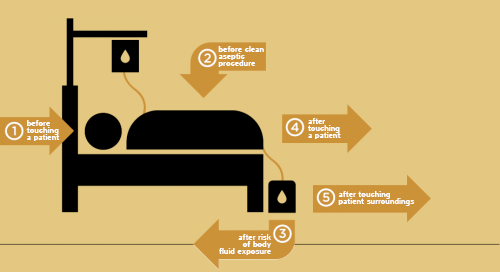Based on the hydro-alcoholic disinfection of hands, the model developed at HUG (Geneva model) reduces the rate of hospital-acquired infections by 50%. Selected as a global benchmark by the World Health Organization (WHO) in 2005, it is now used in almost all UN member states, which is more than 18,000 hospitals.
The HUG Infection Prevention and Control Division (FR) (SPCI) is a WHO Collaborating Center. Together they put in place the first global Patient Safety Challenge: Clean Care is Safer Care. Today, the new global public health challenge is about reducing the use of antibiotics. Geneva University Hospitals are involved in several international projects on this theme, including one funded by the European Union.
The activities of the SPCI are aimed at improving the quality and safety of care through the prevention of infection. They involve, in particular:
- monitoring of seasonal influenza epidemics and respiratory viruses, as well as adherence to preventive measures to be applied by hospital employees and visitors (e.g. hand washing before and after a visit, wearing masks in care units)
- monitoring of hospital-acquired bacteremia with MRSA (Methicillin-resistant Staphylococcus aureus), which in 2016 was at its lowest level since 1998
- the control of Clostridium difficile diarrhea, which is common in the elderly, and has been in significant decline at Hôpital des Trois-Chêne since 2013
- the incidence of ventilator-associated pneumonia in the intensive care unit
- adherence to the five handwashing moments developed by the WHO.
Hand washing: the five moments developed by the WHO
